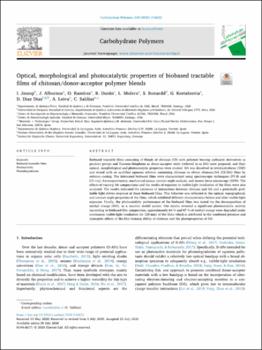Optical, morphological and photocatalytic properties of biobased tractable films of chitosan/donor-acceptor polymer blends
Date
2020Abstract
Biobased tractable films consisting of blends of chitosan (CS) with polymer bearing carbazole derivatives as
pendant groups and fluorene-thiophene as donor-acceptor units (referred to as DA) were prepared, and their
optical, morphological and photocatalytic properties were studied. DA was dissolved in tetrahydrofuran (THF)
and mixed with an acidified aqueous solution containing chitosan to obtain chitosan/DA (CS/DA) films by
solution casting. The fabricated biobased films were characterized using spectroscopic techniques (FT-IR and
UV–vis), thermogravimetry, mechanical assays, contact angle analysis, and atomic force microscopy (AFM). The
effects of varying DA compositions and the results of exposure to visible-light irradiation of the films were also
analyzed. The results indicated the existence of interactions between chitosan and DA and a potentially profitable
light-driven response of these biobased films. This behavior was reflected in the optical, topographical,
and contact angle properties of the films, which exhibited different characteristics before and after visible-light
exposure. Finally, the photocatalytic performance of the biobased films was tested via the decomposition of
methyl orange (MO), as a reaction model system. Our results revealed a significant photocatalytic activity
(according to biobased film composition, approximately 64 % and 87 % of methyl orange were degraded under
continuous visible-light irradiation for 120 min) of the films which is attributed to the combined presence and
synergetic effects of the film-forming ability of chitosan and the photoproperties of DA.





